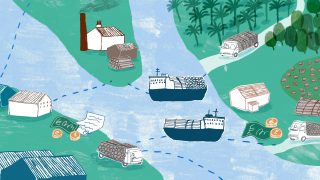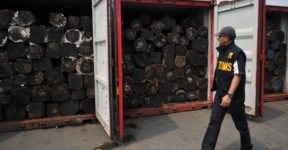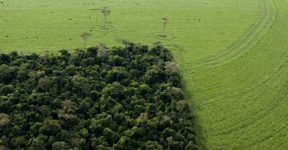
Why Tackling Illegal Logging is Important
What is meant by illegal logging and why is it of concern? Adelaide Glover explains the range of illegal practices that comprise illegal logging and why tackling this issue is of paramount importance if the world is to combat climate change and achieve the global Sustainable Development Goals.
Illegal logging doesn't just involve the stealing of trees from protected forest areas or from outside concession areas, in fact it goes beyond what happens in forests altogether and involves illegal practices related to the licensing, harvesting, processing and trading of timber and paper products.1
The term 'illegal logging' extends to breaking the law at any point along the timber products supply chain, for example, obtaining a logging concession or permit through corrupt processes, logging under an illegally acquired licence, exceeding permitted harvest quotas, processing logs without the necessary licences, tax evasion and exporting products without paying export duties. It also includes the illegal establishment of timber plantations and the harvesting of timber from these. In addition, illegal logging includes the illegal clearance of forests for other land uses such as agriculture, mining or infrastructure – a practice known as 'illegal forest conversion'.
Forest conversion often takes place in the context of complex, contradictory and poorly implemented regulations governing forested areas. A lack of transparency around the process of permit allocation, regulatory loopholes and unclear boundaries of authority between ministries and agencies can all contribute to illegal forest conversion. It can involve breaching forest legislation or other sectoral laws, for example, agricultural, mining or land-use planning.
Another aspect of illegal logging is ‘informal logging' that involves small-scale timber producers who may be operating illegally because of the challenges of complying with the law. This can occur because parts of their national or local legislation are unclear or because compliance with the law is either too expensive or involves lengthy bureaucratic processes that are inaccessible to them.
The world’s forests remain under threat from illegal logging – an issue that perpetuates corruption, undermines livelihoods, fuels social conflict, deprives governments of revenue and erodes the natural resource bases of countries. The SDGs provide a framework for understanding the importance of forests and of the need to harness efforts to tackle illegality in the sector.
Forests are critical to combatting climate change and managing its impacts in particular due to their role in the carbon cycle. The Intergovernmental Panel on Climate Change’s (IPCC) special report on climate change and land states that deforestation is responsible for most of the 13 per cent of global greenhouse gas emissions that come from agriculture, forestry and other land-use sectors and illegal logging is a major factor underlying this: at least one-third of tropical deforestation between 2000 and 2012 has been attributed to illegal forest conversion.2
Forests are home to 80 per cent of terrestrial biodiversity and provide a range of ecosystem services including the maintenance of soils and the provision of clean air in addition to the regulation of climate processes. The continued loss and degradation of natural forests, in particular of highly biodiverse tropical forests, threatens these services and contributes to alarming levels of species extinction.
Forests also make an enormous contribution to economic development: around 1.6 billion people rely on forests for their livelihoods including around 70 million indigenous people.
The forest sector contributes an estimated $600 billion to the global economy and employs over 54 million people. However, 75 per cent of this workforce is employed informally thereby making it difficult for governments to support and regulate these workers, for example, to ensure safety and other work standards are met, to limit unsustainable activities and to collect taxes.
With an ever-increasing global demand for forest products – from paper, to construction materials, to clothing, to fuel – as well as land for agriculture and other sectors, urgent action is needed to establish sustainable production and consumption patterns. But efforts to achieve this are undermined by illegality. Chatham House estimated that nearly one third of timber produced by nine tropical forest countries in 2013 was illegal and that nearly one tenth of imports into 10 consumer countries was illegal.
Forests also play an important role in empowering women and girls and supporting their livelihoods and wellbeing by providing a source of income, nutrition and medicine. Consequently, women are often disproportionately affected by the degradation and loss of forests. Furthermore, they are less likely to be involved in forest governance decision-making, compared to men, which can result in them being further disadvantaged by the outcomes of these processes.
Despite the huge importance of forests in the sustainable development agenda, there has been little progress with ending the loss of natural forests. In fact, the loss of primary forests is increasing. Between 2014 and 2018, after the New York Declaration on Forests (NYDF) was endorsed with the aim to halt global forest loss, average annual tropical forest loss accelerated by 44 per cent.
In terms of climate impacts, on average, emissions from annual tropical tree cover loss between 2014 and 2018 were 4.7 gigatons of CO2 per year – more than all of the European Union’s 2017 greenhouse gases emissions.
Success in both meeting global climate commitments and the SDGs will require radical improvements in the way the world’s forest resources are governed. That's why this website aims to increase transparency and enhance understanding of the issue of illegal logging and of the different ways in which both governments and civil society are seeking to address it in order to share best practices and identify ways forward to meet global climate commitments and goals for sustainability.
Related Countries
- 1.Timber sector products include logs, sawn wood, veneer, plywood, mouldings, joinery, wooden furniture, particleboard and fibreboard (other panels), ‘not elsewhere specified’ and other timber. Paper sector products include chips & residues (biomass) and pulp & paper.
- 2.Lawson, S. (2014), Consumer Goods and Deforestation: An Analysis of the Extent and Nature of Illegality in Forest Conversion for Agriculture and Timber Plantations. Washington, DC: Forest Trends.


